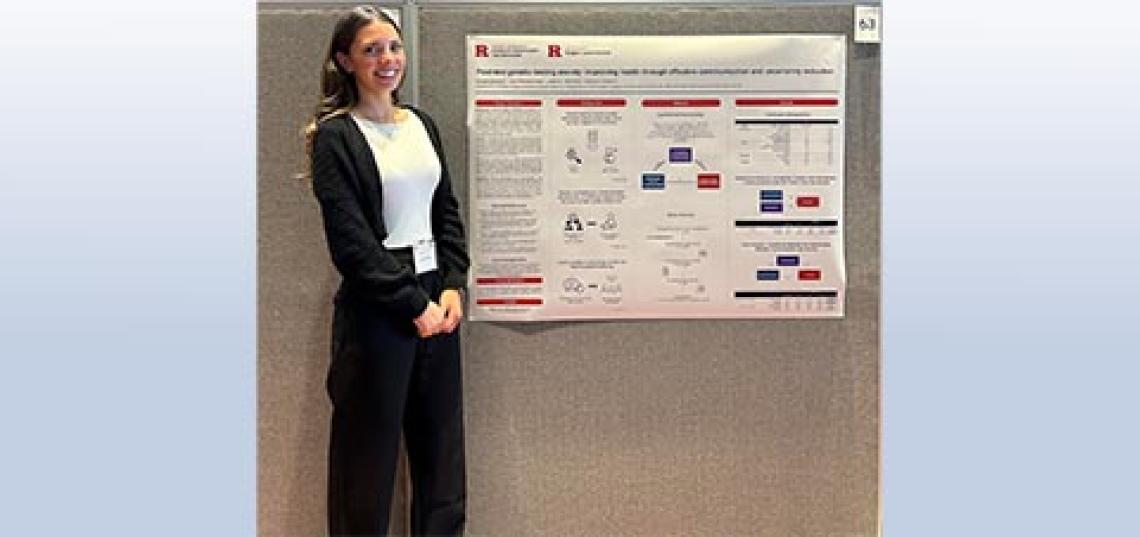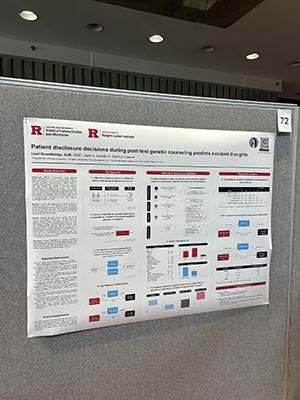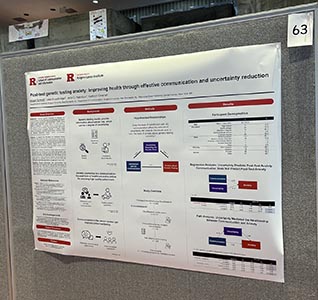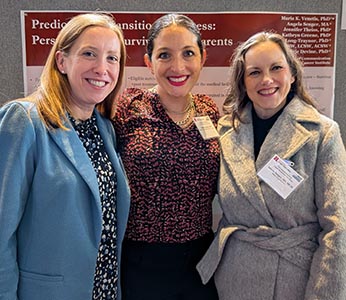
At the 2025 Annual Retreat on Cancer Research held on May 22 at the Rutgers Robert Wood Johnson Medical School in Piscataway, NJ, SC&I faculty and Ph.D. students were among the nationally renowned scholars to present their cutting-edge research findings.
Hosted by The Cancer Institute of New Jersey (CINJ) and the New Jersey Commission on Cancer Research (NJCCR), the retreat, according to CINJ, “included a series of simultaneous mini-symposia as well as several poster sessions highlighting the latest cancer research being conducted at the Cancer Institute and other leading institutions throughout New Jersey.”
The event began with the presentation of the posters, followed by a welcome message delivered by Steven K. Libutti, MD, FACS, Director of the Rutgers Cancer Institute and Kenneth R. Adler, MD, FACP, Chairperson of the New Jersey Commission on Cancer Research.
 The event also included focus sessions which this year explored “Cancer Metabolism and Immunology and Cancer Pharmacology”; “Clinical Investigations and Precision Therapeutics and Genomic Instability and Cancer Genetics”; and “Cancer Prevention and Control.”
The event also included focus sessions which this year explored “Cancer Metabolism and Immunology and Cancer Pharmacology”; “Clinical Investigations and Precision Therapeutics and Genomic Instability and Cancer Genetics”; and “Cancer Prevention and Control.”
The keynote lecture, “Deciphering and Targeting Clonal Evolution in Myeloid Transformation,” was delivered by Ross L. Levine, MD. Levine is Senior Vice President, Translational Research, at Memorial Hospital at Memorial Sloan Kettering (MSK). He is also an Attending Physician on the Leukemia Service, Department of Medicine, the Laurence Joseph Dineen Chair in Leukemia Research, and a Professor of Medicine at Weill Cornell Medical College.
SC&I Professor of Communication Kathryn Greene, who co-authored the three posters that SC&I faculty and students presented at the event, said, “The retreat is an opportunity for patients, community members, students, researchers, and clinicians to share insights that can lead to improvements in cancer prevention and treatment in NJ. Our team also values the opportunities for students at multiple levels to become more familiar with important cancer research. The event combines research from both Rutgers legacy and RWJ-BH, coming together to address NJ cancer needs.”
The first poster, “Patient Disclosure Decisions During Post-Test Genetic Counseling Predicts Avoidant Thoughts,” was presented by SC&I Ph.D. Student Liesl Broadbridge; Jada G. Hamilton, Associate Attending Psychologist and Co-Director, Genomics, Risk & Health Decision-Making Laboratory, Memorial Sloan Kettering Cancer Center; and SC&I Professor of Communication Kathryn Greene. “Effective communication during post-test genetic counseling,” the authors wrote, “is crucial for ensuring patients begin to adapt to their genetic test results and feel equipped to adhere to cancer prevention recommendations. Patients’ decisions regarding what information is shared with and what is withheld from their clinician are integral in achieving effective communication and adaptation to illness in other clinical contexts.” The study found that “withholding of relevant information during post-test genetic counseling was associated with more avoidant thoughts. Clinicians providing genetic testing results should seek to actively elicit and address topics of worry or concern, even for those who receive negative results.”
 The second poster, “Post-test Genetic Testing Anxiety: Improving Health through Effective Communication and Uncertainty Reduction,” was presented by Abbey Schmitt, a rising senior majoring in Genetics; co-authors include Broadbridge, Hamilton, and Greene. In this project, the authors “tested the relationship between satisfaction with genetic counselor communication during post-test counseling, uncertainty about test results, and anxiety experienced after genetic testing. Results demonstrate that communication may facilitate better psychological health after genetic testing when the communication also helps reduce uncertainty about the meaning of the test results. The unexpected finding that communication did not have a direct effect on anxiety as it does in other cancer settings underscores the unique features of post-test genetic counseling. Future interventions should focus on communication to reduce patient uncertainty to improve genetic testing experiences.”
The second poster, “Post-test Genetic Testing Anxiety: Improving Health through Effective Communication and Uncertainty Reduction,” was presented by Abbey Schmitt, a rising senior majoring in Genetics; co-authors include Broadbridge, Hamilton, and Greene. In this project, the authors “tested the relationship between satisfaction with genetic counselor communication during post-test counseling, uncertainty about test results, and anxiety experienced after genetic testing. Results demonstrate that communication may facilitate better psychological health after genetic testing when the communication also helps reduce uncertainty about the meaning of the test results. The unexpected finding that communication did not have a direct effect on anxiety as it does in other cancer settings underscores the unique features of post-test genetic counseling. Future interventions should focus on communication to reduce patient uncertainty to improve genetic testing experiences.”
Commenting on the two posters she co-authored, Broadbridge said, “As genetic testing is increasingly being ordered as part of routine cancer care, understanding effective communication during the post-test results call is critical for ensuring quality patient care. These two studies are part of a larger project we are working on that will begin to describe patient experiences during post-test counseling and the types of communication that are associated with better psychological outcomes.”
 The third poster, “Predictors of Transition Readiness: Perspectives of Survivors and Parents” was written by SC&I Professor of Communication Maria Venetis; CINJ’s Angela Senger, Research Coordinator, Pediatric Population Science, Outcomes, and Disparities Research Department: Section of Pediatric Population Science, Outcomes, and Disparities Research in the Division of Pediatric Hematology/Oncology; SC&I Professors of Communication Jennifer Theiss and Kathryn Greene; and CINJ’s Karen Long-Traynor, Clinical Psychologist, Division of Pediatric Hematology/Oncology; Susan Stephens, Social Worker, Division of Pediatric Hematology/Oncology (now retired); and Katie Devine, Associate Director of the New Jersey Pediatric Hematology and Oncology Research Center of Excellence (NJPHORCE) at Rutgers Cancer Institute and an Associate Professor of Pediatrics and the Section Chief of Pediatric Population Science, Outcomes, and Disparities Research in the Division of Pediatric Hematology/Oncology at Rutgers Robert Wood Johnson Medical School.
The third poster, “Predictors of Transition Readiness: Perspectives of Survivors and Parents” was written by SC&I Professor of Communication Maria Venetis; CINJ’s Angela Senger, Research Coordinator, Pediatric Population Science, Outcomes, and Disparities Research Department: Section of Pediatric Population Science, Outcomes, and Disparities Research in the Division of Pediatric Hematology/Oncology; SC&I Professors of Communication Jennifer Theiss and Kathryn Greene; and CINJ’s Karen Long-Traynor, Clinical Psychologist, Division of Pediatric Hematology/Oncology; Susan Stephens, Social Worker, Division of Pediatric Hematology/Oncology (now retired); and Katie Devine, Associate Director of the New Jersey Pediatric Hematology and Oncology Research Center of Excellence (NJPHORCE) at Rutgers Cancer Institute and an Associate Professor of Pediatrics and the Section Chief of Pediatric Population Science, Outcomes, and Disparities Research in the Division of Pediatric Hematology/Oncology at Rutgers Robert Wood Johnson Medical School.
“Adolescent and young adult cancer survivors benefit from additional medical surveillance and treatment into adulthood,” the authors said. “However, without parental prompting and guidance, many survivors do not engage in this necessary care. Our research examines transition readiness, the shift from parental to independent care. We examine how survivor and parent communication practices in the home and clinic promote survivor transition readiness. Results demonstrate that parents' and survivors' perceptions of survivors' readiness differ. Further, survivors who are comfortable communicating directly with clinicians are more prepared for this transition.”
Reflecting on the impact of the event, Venetis said, “The retreat is a wonderful annual event that facilitates connection among scholars and clinicians in the effort of improving lives of patients and families in New Jersey.”
Learn more about the Communication Department at the Rutgers School of Communication and Information on the website.
Photos: Courtesy of Kathryn Greene and Maria Venetis
